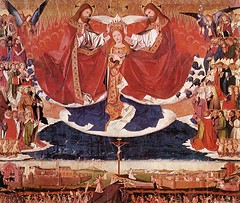Here are some of the concluding highlights of the Anglican-Roman Catholic joint statement on the place of the Blessed Virgin in the life of the Church. It looks very hopeful. I encourage you to read the whole thing.
-the teaching that God has taken the Blessed Virgin Mary in the fullness of her person into his glory as consonant with Scripture, and only to be understood in the light of Scripture (paragraph 58);
-that in view of her vocation to be the mother of the Holy One, Christ's redeeming work reached 'back' in Mary to the depths of her being and to her earliest beginnings (paragraph 59);
-that the teaching about Mary in the two definitions of the Assumption and the Immaculate Conception, understood within the biblical pattern of the economy of hope and grace, can be said to be consonant with the teaching of the Scriptures and the ancient common traditions (paragraph 60);
-that this agreement, when accepted by our two Communions, would place the questions about authority which arise from the two definitions of 1854 and 1950 in a new ecumenical context (paragraphs 61-63);
-that Mary has a continuing ministry which serves the ministry of Christ, our unique mediator, that Mary and the saints pray for the whole Church and that the practice of asking Mary and the saints to pray for us is not communion-dividing (paragraphs 64-75)
Wednesday, June 01, 2005
Subscribe to:
Post Comments (Atom)


3 comments:
My reaction
WB,
Out of curiosity, on what issues are you in dissent with Rome?
Philip
Philip,
To be honest, not many. As I said somewhere before, I don't agree with the definition of (1) Immaculate Conception, (2) Assumption of the BVM, or (3) Papal Infallibility, QUA DOGMAS. I believe (1) and (2), but don't believe they are a part of the Catholic Faith, apart from which there is no salvation. I certainly do not believe that (3) is such, and I don't even think I believe (3) simpliciter.
So I'm trying to distinguish between (1), (2), and (3) *by themselves* and (1), (2), and (3) *as dogma*. I guess what this comes down to is that I don't really accept the Roman Catholic teaching about the pope's authority. I'm happy to call the pope all kinds of things (pope, prince of apostles, patriarch of the west, primus inter pares, christ vicar, etc. etc.), but I do not believe that he has an infallible prerogative, and I don't like the title "head of the church on earth." I'm much more comfortable with something like the East's understanding of the pope and his authority.
Needless to say, if I ever swim the Tiber, I will defer judgment on these things and accept the Roman Church's teaching.
Post a Comment